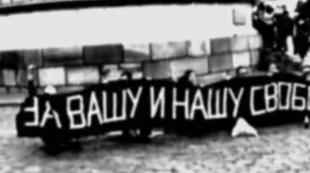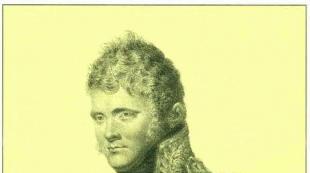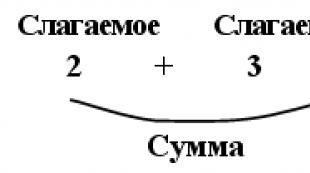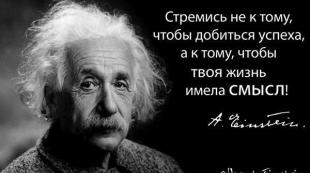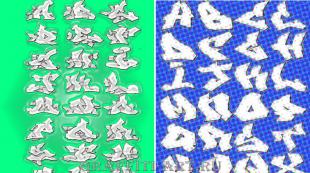Characteristic of Achilles quotes from the Iliad. Achilles is the hero of ancient Greek mythology. The driving force behind Achilles
The image of Achilles in the Iliad
Achilles is one of the most complex figures in all ancient literature. In the first stage of his tragedy, when he is in a quarrel with Agamemnon, he behaves rather passively. His action here is mainly "anger" against his offender. In Achilles, above all from the very beginning - a huge destructive force, bestial revenge, lust for blood and cruelty. But, on the other hand, the whole meaning of this blood, this atrocity lies in friendship with Patroclus, because of which he starts all this carnage. The image of a beloved friend lives with the beast For Achilles it is very characteristic, for example, that after the appearance of the moat in a wild and fierce form and after the panic caused by his terrible cry from his enemies, he sheds "hot tears" over the corpse of his faithful comrade. In addition, Homer's Achilles is generally characterized by soft and gentle features, which should not be forgotten when characterizing him. He is pious and often turns to the gods (libation and prayer to Zeus for Patroclus entering the battle), he is restrained, for example, when he deals with the messengers of Agamemnon, considering them completely innocent, he is struck by the fire that began on Greek ships, he is loving a son who often speaks to his mother and cries about her, as, for example, after an insult received from Agamemnon or after the notification of the death of Patroclus. This antithesis is the most characteristic feature of Achilles. On the one hand, he is angry, hot-tempered, rancorous, merciless in war, this is a beast, not a man, so Patroclus is quite right in telling him
You are cruel in your heart. Your father was not Peleus the horse-fighter, Mother was not the goddess Thetis. You were born by the sparkling sea. Hard rock, - from them you have a cruel heart.
However, this is how he reacts to the death of his friend:
A black cloud of sorrow covered Peleev's son. In a handful of hands he took smoky ash with both hands, He sprinkled his head with them, his beautiful outrageous appearance. He stained his entire fragrant tunic with black ash, while he Himself, large, stretched out in a large space, lay in gray dust and tormented his hair, disgracing it.
This antithesis of a stern fighter and a gentle heart is the main thing that we find in Achilles. In the experience of Achilles, the dictates of fate and his own raging of life coincide. He knows that he will not return from Troy, and nevertheless, he undertakes a difficult and dangerous journey. Before a decisive battle, the horses predict his imminent death, appointed by fate, but this does not stop him at all:
What are you, Xanthus, prophesying death for me? Not your concern! I myself know well that fate is destined for me to perish Here, far from my father and from my mother. But I will not leave the battle until the Trojans eat their fill of war!
Achilles has a secret knowledge, a secret vision of his destiny.
Achilles / Achilles (fast-footed, godlike) is the central character of the poem, without the participation of this warrior Troy could not fall. Achilles is the ideal warrior of the heroic era. Cruel, bloodthirsty, selfish. Achilles is bloodthirsty: he avenges the death of his beloved friend and kills so many Trojans that the water in the river turns into blood (including killing the sons of Priam). Completely cold-blooded and indifferently sacrifices the captive youths at the grave of Patroclus.
In the image of Achilles, individualism and pride, resentment prevail. He raises his personal quarrel with Agamemnon to cosmic proportions. Achilles dreams only of personal glory and is ready to give his life for this.
In the experience of Achilles, the dictates of fate and his own raging of life coincide. He knows that he will not return from Troy, and nevertheless, he undertakes a difficult and dangerous campaign:
What are you, Xanthus, prophesying death for me? Not your concern!
I know myself well that fate is destined for me to perish
Here, far from my father and mother. But I will not quit
From the battle, until the Trojans eat their fill of war!
Comparative characteristics of the images of Achilles and Hector
Hector, the son of Priam, in Homer acquires the most human, pleasant features. Hector, unlike Achilles, is a hero who knows what social responsibility is, he does not put his personal feelings above others. Achilles, on the other hand, is the personification of individualism (he brings his personal quarrel with Agamemnon to cosmic proportions). In Hector there is no bloodthirstiness of Achilles, he is generally an opponent of the Trojan War, sees in it a terrible calamity, understands all the horror, the entire dark, disgusting side of the war. It was he who proposes to fight not with troops, but to put up representatives (Paris-tr., Menelaus-Greeks).
Hector, unlike Achilles and other heroes, is shown from a completely different angle, in a peaceful life. The scene of his farewell to Andromache (wife) is one of the most subtle psychological scenes in the poem. She asks him not to participate in the battle, because there Achilles, who destroyed Thebes and her entire family. Hector loves his loved ones very much and understands that Andromache will be completely alone without him, but the duty of the defender of the Fatherland is above all for him. Shame will not allow him to hide behind a wall.
Hector is accompanied by the gods (Apollo, Artemis), but his difference from Achilles is endless. Achilles is the son of the goddess Thetis, he is not subject to human weapons (except for the heel). Achilles, in fact, is not a man, but a half-demon. Getting ready for battle, Achilles wears the armor of Hephaestus. Hector, on the other hand, is a simple person who is facing a terrible test, he understands that only he can accept the challenge, and Athena helps Achilles.
The images of these two characters are very different. If the name of Achilles opens the poem, the name of Hector ends it. "So they buried the horse-borne Hector's body."
ACHILLES is the central figure of the work, the personification of military valor, courage and firmness. The leader of the Achaeans, who for 10 years led the siege of Troy, Agamemnon insults Achilles, because of which he refuses to fight on the side of the Achaeans. This leads to numerous defeats of their troops. However, when Achilles' friend Patroclus dies at the hands of Hector, Achilles forgives the offense and reconciles with Agamemnon. The valiant ACHILLES is under the auspices of the goddess Athena, performs feat after feat in battle and finally kills Hector, which predetermines the final victory of the Achaeans. Achilles is a typical mythological epic hero, a brave warrior, for whom nothing is more important than military valor, honor and pride. get yourself the immortal glory of a warrior. He presents his life as an uninterrupted chain of exploits on the battlefield. He prefers constant risk and a glorious death on the battlefield to home comfort and peace, a serene life.
Characteristics of the Heroes Based on the Iliad by Homer | Achilles
Searched on this page:
- cousin achilles
- Achilles characteristic
- Achilles characteristic
- ahill characteristic
Achilles
ACHILLES (ACHILLES) - the hero of Homer's poem "Iliad" (between the 10th-8th centuries BC). V Greek mythology A. - the son of the sea goddess Thetis and Peleus, king of the city of Phthia in Thessaly. By the name of his father in the Iliad, A. is called Pelid or Peleev's son. Myths say that A. was predicted to die in battle from an arrow shot by the enemy. In an effort to protect her son and make his body invulnerable, Thetis held the baby over the fire, immersed it in the waters of the Styx, the rivers of the underworld of the dead. At the same time, she held A. by the heel, which remained his only vulnerable spot. This is how the expression "Achilles' heel" arose. A. was brought up by the wise centaur (a man with the body of a horse) Chiron, who raised such heroes as Hercules and Jason. The soothsayer Calchas predicted that the Greeks would win the war with Troy, the root cause of which was the abduction by Paris, the son of the Trojan king Priam, the wife of Menelaus the Beautiful Helena, only if A. Thetis hid A. in the palace of King Lycomedes on the island of Skyros. A. lived here among the daughters of the king, dressed in women's clothing. But the soothsayer Calchas guessed Thetis' plan. Menelaus' companions Diomedes and Odysseus, the king of Ithaca, went to Skyros, taking with them rich gifts for the princesses: fabrics, gold-embroidered clothes, necklaces and other adornments. All this was brought to the chambers of the princesses, placing weapons and military armor between the gifts. It was the last gifts that A. chose. Having learned about the upcoming campaign against Troy, A. gladly agreed to participate in it. His friend Patroclus went with him. Having sailed from the harbor of Aulis, the ships of the Greeks set out for Troy. But they landed on the shores of Mizia, where Telef, the son of Hercules, reigned. Having mistaken the Mizians for the Trojans, the Greeks entered the battle with them. A., fighting Telephus, put him to flight. Finding a mistake, the Greeks set off again, but the storm scattered their ships, and they were forced to return to Aulis. Here they realized that only Telef, who was severely wounded by A. Pythia, a fortuneteller from the city of Delphi, could show them the right path to Troy, she said that only A. could heal the wound, which the latter did, sprinkling the ulcer with iron, which he scraped off from his spear. But they still failed to sail from Aulis, for there was no tailwind. Calchas predicted that the wind would appear only if Agamemnon's daughter Iphigenia was sacrificed to the gods. The girl was brought to Aulis, telling her mother Clytemnestra that A. wants to become engaged to her. Having learned about this, A. begins to help Iphigenia, who is saved by the goddess Artemis at the last moment before the sacrifice. All this is described in the tragedy of Euripides "Iphigenia at Aulis" (V "Sw. BC).
x The Greeks besieged Troy for 10 years. The protagonist of the Trojan War was A., whom the Iliad, which tells about the last year of the siege, calls him “noble”, “fast-footed”, “immortal like”, “favorite of the gods”. The Iliad begins with a description of A.'s anger, from whom Agamemnon took away his captive Briseis. Main character Trojans, the son of King Priam Hector kills a friend of A. Patroclus. A. is grieving over his death and vows to take revenge. One of the culminating points of the poem is A.'s battle with Hector, described in book XXII of the Iliad. After killing Hector, A. mourns and buries Patroclus. This is how Homer's poem ends. The image of A. in the Iliad is contradictory. He is both noble and at the same time extremely cruel. The further fate of A. is told by myths and literary works ancient Greek and Roman writers. In the so-called. Cyclical poem "Ethiopis" (VIII "Sw. BC), attributed to the Arctic, the son of Teles from Miletus, and which has come down to us only in a late retelling, tells about the women warriors of the Amazons who came to the aid of the Trojans, led by Queen Pen -fesilea. A. kills her, but, standing over her body, imbued with love for her. This plot is touched upon in the poems of Ovid "Heroines" and Virgil "Aeneid". The Ethiopis also tells about the battles with the Ethiopians, whom their king Memnon brought to the aid of the Trojans. Memnon dies in a duel with A. But the hero will also face an inevitable, predicted end. He dies from the arrow of Paris, which the god Apollo, who patronized the Trojans, sent to A.'s heel - his only vulnerable spot. The Greeks and Thetis, who rose from the depths of the sea, mourn the hero and, according to ancient customs, on the eighteenth day, burn his body on a funeral pyre. A golden urn with the ashes of A., Patroclus and another hero, Antilochus, was buried in a high mound. Hiding on the island of Skyros, A. fell in love with Daidamia, one of the daughters of King Lycomedes. From their union was born after the departure of the Greeks to Three, the son of Neoptolemus. After the death of his father, he is brought to the walls of Troy, and he participates in the capture of the city, kills Priam and many of his sons. In the XI song "Odyssey" it is told how Odysseus, having descended into the realm of the dead, meets the shadow of A. there and tells his deceased friend about the exploits of his son. The image of A. was repeatedly developed in the visual arts, starting with the ancient Greek vase painting and ending with the lithographic cycle "Achilles", created by the German artist Max Slevogt in 1907.
In the poem The Iliad, both the Greeks and Achilles are inferior in honesty to Hector. Hector, the son of Priam, in Homer acquires the most human, pleasant features. Hector, unlike Achilles, is a hero who knows what social responsibility is, he does not put his personal feelings above others. Achilles, on the other hand, is the personification of individualism (he brings his personal quarrel with Agamemnon to cosmic proportions). In Hector there is no bloodthirstiness of Achilles, he is generally an opponent of the Trojan War, sees in it a terrible calamity, understands all the horror, the entire dark, disgusting side of the war. It is he who proposes to fight not with the military, but to put up representatives (Paris-tr., Menelaus-Greeks). But the gods do not allow him to do this. Paris, thanks to Aphrodite, escapes from the battlefield.
Hector, unlike Achilles and other heroes, is shown from a completely different angle, in a peaceful life. The scene of his farewell to Andromache (wife) is one of the most subtle psychological scenes in the poem. She asks him not to participate in the battle, because there Achilles, who destroyed Thebes and her entire family. Hector loves his loved ones very much and realizes that Andromache will be completely alone without him, but the duty of the defender of the Fatherland is above all for him. * Sob sob * Shame will not allow him to hide behind the wall.
So, both Hector and Achilles are famous warriors. However, if Achilles puts his personal feelings, personal gain above all else, then Hector sacrifices himself for the sake of the Fatherland, abandoning a peaceful family life in the name of his state. * Sob sob *
Hector is accompanied by the gods (Apollo, Artemis), but his difference from Achilles is endless. Achilles is the son of the goddess Thetis, he is not subject to human weapons (except for the heel). Achilles, in fact, is not a man, but a half-demon. Getting ready for battle, Achilles wears the armor of Hephaestus. Hector, on the other hand, is a simple person who is facing a terrible test, he understands that only he can accept the challenge of A. It is not surprising that when he sees Achilles, he is seized with horror, and he runs (three times the heroes run around Troy hyperbole). The moira goddesses decide the fate of the heroes by placing their lot on the scales. Athena helps Achilles. Dying, Hector asks for only one thing - to hand over his body to his relatives so that they can perform the funeral rite (very important for the Greeks). However, Achilles avenges his friend's death and says that he will throw Hector's body to be devoured by dogs and thieves.
The images of these two characters are very different. If the name of Achilles opens the poem, the name of Hector ends it. "So they buried the horse-borne Hector's body." Hector contains everything human (both strengths and weaknesses (he is horrified by Achilles, runs) Achilles is almost a half-demon.
Short version
Achilles is the personification of individualism, a living beginning, a half-demon, the ideal of the Greek warrior. Hector of properties. he is all human. He is honest, an opponent of war, he offers to fight not with the military, but the representative. (Paris, Menelaus) G. is shown in a peaceful life: farewell to Andromache - subtle psychological scene of the poem. Patriot: Shame won't let him hide behind the walls. When he sees Ah. Used horror, he runs away. They run around Troy three times, G. resigns himself to fear. The lot decides the death of G. Asks Akh. To give up the body of his relatives, but Akh. Refuses, since he avenges Patroclus.
Super Brief
Hector is a normal person, and Achilles is a cruel half-demon, selfish, loving himself. For Hector, the duty of the Fatherland is above all
^ 11. Cunning Odysseus - the bearer of worldly wisdom. V.G.Belinsky about the Odyssey.
VG Belinsky wrote: “Odysseus is the apotheosis of human wisdom; but what is his wisdom? In cunning, often crude and flat, in what in our prosaic language is called "cheating." And meanwhile, in the eyes of the infant people, this cunning could not but seem to be the extreme degree of possible wisdom. " (Mwhahahahaha! I did find that he wrote about Odyssey)
The constant epithet of Odysseus in the Odyssey is "long-suffering", "clever". Odysseus is very different from other heroes (including the heroes of the Iliad). The image of Odysseus depicts the highest degree of practical sharpness and cunning. He does not trust the gods, perfectly aware of their cunning and cunning disposition. Once in another shipwreck, Odysseus accepts the gift of the nymph Leucothea (cloak), but does not let go of the log, because understands that you cannot count on the gods (they say, hope for God, but don’t make a mistake yourself)
The image of Odysseus is saturated with patriotism, love for the homeland. He dreams of returning to Ithaca, to his wife Penelope, the son of Telemachus. The practical and business inclination of his nature acquires its real meaning only in connection with his selfless love for his home and his waiting wife, as well as his constantly difficult fate, which makes him constantly suffer and shed tears far from their homeland. Athena speaks to Zeus about his constant suffering at the advice of the gods and asks him to return Odysseus home. Poseidon is constantly angry with him. His nanny wonders why the gods are constantly indignant at him with his constant piety and obedience to the will of the gods. His grandfather named him precisely as "a man of divine wrath."
Unsurprisingly, he often resorts to trickery. Either he crawls out of the cave under the belly of a ram, clutching at its fur, and thereby deceives the vigilance of the blind Polyphemus, or he intoxicates the Cyclops and the cannibal and gouges out his only eye. Either he jumps past the sirens, where no one has ever passed safe and sound, then he sneaks into his own palace and takes possession of it. He himself speaks of his subtle cunning, and Polyphemus guessed that it was not power that killed him, but the cunning of Odysseus.
Odysseus is very careful, in fact he does not trust anyone, he is cunning and prudent. He manifests himself in different areas of life. He is a carpenter, a plowman, and a navigator. It unites almost all the knowledge of its era. Odyssey also has features that make him related to other heroes. He is a fighter, extremely cruel (kills all suitors), communication with the gods (Athena, Hermes) is inherent in him. Nevertheless, his cunning, intelligence and foresight distinguish him from everyone else.
Short version
VG Belinsky wrote: “Odysseus is the apotheosis of human wisdom; but what is his wisdom? In cunning, often crude and flat, in what in our prosaic language is called "cheating." And meanwhile, in the eyes of the infant people, this cunning could not but seem to be the extreme degree of possible wisdom. "
Odd "long-suffering", "smart". Cunning. Resourceful. Doesn't trust the gods (accepts Leucotea's cloak, but doesn't throw the log) Patriot. Despite all the troubles, he strives for his wife and son, for Ithaca. Poseidon is angry with him because he blinded his son, Polyphemus. Combines all the knowledge of the era, carpenter, navigator, warrior. However, cruel (murder of suitors), communicates with the gods (Athena)
Super Brief
Odysseus is very cunning, does not trust the gods and always comes out of various situations that the gods arrange for him. And Belinsky said that he was cheating.
Homer asks Muse to tell him about Odysseus's wanderings. At the meeting of the gods on Olympus, Zeus recalls the madness of Aegisthus, who disregarded warnings from above, seduced Agamemnon's wife, Clytemnestra, and plotted the murder of the latter. Later, he is killed by Agamemnon's son, Orestes.
The goddess Athena convinces Zeus that Odysseus must return home, despite the anger of Poseidon, the god of the sea, who was angry with Odysseus, because he blinded his son, the Cyclops Polyphemus. Athena goes to Ithaca to give advice to Odysseus's son Telemachus. She demands that he visit the Greek kings, Nestor and Menelaus, in search of news of Odysseus. The next day, Telemachus calls a meeting and threatens to expel his mother, Penelope, from the house of the suitors.
BOOK 2 Telemachus complains to the congregation about the behavior of the suitors and asks the latter to return to their home. The two main suitors, Antinous and Eurymachus, accuse Penelope of not choosing a husband. Antinous tells how Penelope deceived and postponed her decision, weaving clothes for Laertes, Odysseus's father, during the day and unweaving what was done at night. With the help of Athena, Telemachus finds himself a ship and sails to Pylos, the city of Nestor, one of the participants in the Trojan War.
BOOK 3 In Pylos, Telemachus is met by King Nestor, who talks about how the Greeks left Troy, about the murder of Agamemnon and about Menelaus' return home. At the request of Telemachus, Nestor, in great detail, tells the story of Aegisthus and Clytemnestra, their conspiracy against Agamemnon and the vengeance of Orestes. Nestor sends his son, Pisistratus, to accompany Telemachus to Sparta, to the king Menelaus.
BOOK 4 Telemachus and Pisistratus arrive in Sparta. King Menelaus celebrates the weddings of his children, Hermione and Megapenth. Menelaus welcomes the newcomers; Elena joins them. They recall the exploits of Odysseus in Troy. Menelaus tells about his meeting with the sea elder Proteus, who told him about the death of Ajax at sea, about the murder of Menelaus's brother, Agamemnon, and about the capture of Odysseus on Ogygia, the island of the nymph Calypso. At the same time, the suitors on Ithaca learn about the departure of Telemachus and plot to kill him.
BOOK 5 At the request of Athena, Zeus sends a messenger, Hermes, to the nymph Calypso with a demand to let Odysseus go home. Odysseus builds a raft and sails to Scheria, the land of the Faecians. Poseidon, still angry with Odysseus, breaks his raft, but, with the help of Athena and the sea nymph Ino, Odysseus makes it to shore.
BOOK 6 The next morning, Nausicaa, daughter of the king of the Faecias, goes to the seashore to wash her clothes, as Athena ordered her. Odysseus appears, frightening Nausicaa and her maids. Because he asks for help, Nausicaä gives him clothes and explains how best to appear in the house of her father, Alcinoe.
BOOK 7 Arrival of Odysseus at the palace of Alcinoe. He is given a place at the feast. Alkinoy promises that he will help Odysseus return to his homeland. Without revealing his name, Odysseus talks about his stay with Calypso and his journey to Scheria. Alkinoy asks Odysseus to stay and offers him his daughter Nausicaa as his wife. However, if Odysseus wants to return home, the phaeacs will help him.
BOOK 8 At a feast at the Feacs, the singer Demodok sings about Three; athletic competitions are held. Alcinoe's son, Laodamas, asks Odysseus to take part in the competition. Odysseus shows his skill in discus throwing. Demodok sings about the love of Ares, the god of war, and Aphrodite, the goddess of love, and how Hephaestus, the husband of Aphrodite, caught them and put them on display to all the gods. The Phaeacs give Odysseus rich gifts. At the request of the latter, Demodok sings about the Trojan Horse. Odysseus is moved to tears; he is asked to reveal who he is and why he cries when told about Troy.
BOOK 9 Odysseus calls his name and begins the story of his travels. He describes the departure from Troy, beginning with the attack on the Kikons, during which many of his people died in madness. Then Odysseus talks about a visit to the island of lotophages; after tasting their food, many of Odysseus's people forgot about home. Odysseus also tells about the adventures in the land of the Cyclops: they were taken prisoner by Polyphemus; he ate several warriors; the rest intoxicated him, blinded him and fled from the cave. After Odysseus boasted of success, Polyphemus called on Poseidon, his father, to avenge him, which caused Poseidon's anger at Odysseus.
BOOK 10 Odysseus tells how he and his people reached the island of Aeolus, the king who was given power over the winds by the gods. Aeolus gives Odysseus a bag containing the winds, which should help Odysseus return home. Odysseus's men, however, thought that the bag contained treasures. Already off the coast of Ithaca, Odysseus's people, while he was sleeping, opened the bag. As a result, they were washed up again on the shores of the island of Eola, but the latter refused to help them a second time. Sailing further, the travelers reached the land of the Laestrigones. These giants attacked them and destroyed all but one of Odysseus' ships. Then Odysseus landed on the island of the sorceress Kirka, who turned his people into pigs. With the help of Hermes, Odysseus escaped the same fate and forced Kirk to remove the spell from his people. Odysseus and his men stayed with Kirk for a whole year. Before their departure, Kirka told Odysseus that he should visit the realm of the dead and consult with the soothsayer Tiresias.
BOOK 11 In the realm of the dead, Tiresias warns Odysseus not to touch the flock of Helios, the sun god. Odysseus also met his mother, Anticlea. Here Odysseus is interrupted: he is praised by the queen of the Feacs Aretas. Alkinoy asks Odysseus to continue and talk about the meeting with the shadows of the Greek heroes. Odysseus recounts a meeting with Agamemnon and Achilles and with other heroes.
BOOK 12 Odysseus tells how he and his people returned to the island of Kirki. Travelers sail past the sirens and Odysseus, tied to the mast, heard their songs. Then they passed the maelstrom of Charybdis and the monster Scylla, which ate six of Odysseus's people. At the request of Eurylochus, one of Odysseus's comrades, they landed on Trinakia, the island of the sun god Helios. The storms held them here for a month and, despite Odysseus's warning, his men killed the god's flocks while Odysseus slept. Zeus punished them with a storm at sea, during which only Odysseus was saved. He reached the island of Calypso and, with this, Odysseus ends the story.
BOOK 13 Theaki escort Odysseus to Ithaca and leave him asleep on the island. On the way back, Poseidon turns their ship to stone. Athena advises Odysseus on how to defeat the suitors and turns him into an old man.
BOOK 14 Odysseus goes to the house of his old servant Eumeus, who welcomes him well. Odysseus tells him a fictional story about his life: he, a Cretan warrior, fought in Troy; then he visited Egypt, Phoenician and other countries. BOOK 15 At the request of Athena Telemachus leaves the palace of Menelaus in Sparta. On Ithaca, Eumeus answers Odysseus's questions; he tells how he was kidnapped by a Phoenician servant, how he was ransomed by Laertes. At this time, Telemachus avoids the ambush of the suitors and safely disembarks on Ithaca.
BOOK 16 Telemachus visits Eumeus and sends him to inform Penelope of his arrival. Odysseus opens to Telemachus and they make a plan of revenge on the suitors. Penelope and the suitors learn that Telemachus has returned. The bridegrooms are advised whether they should kill Telemachus. Penelope chides them for this.
BOOK 17 Telemachus returns home and tells Penelope about his journey. Odysseus, disguised as a beggar, goes to the palace, accompanied by Evmeus. When they approach the house, Argos, Odysseus's old dog, recognizes him and dies. Odysseus begs the suitors and tells them a fictional story about his adventures. Antinous, the main groom, insults Odysseus and throws a stool at him. Eumey tells Penelope about the "alien".
BOOK 18 Penelope complains about the behavior of the suitors. The feast turns into a fight after Odysseus angers Eurymachus, one of the suitors.
BOOK 19 Odysseus and Telemachus remove weapons and armor from the hall. Penelope asks Odysseus questions. He tells her a fictional story. Eureklea's nanny washes Odysseus' feet and recognizes him by his scar. She almost betrays Odysseus. Penelope invites the suitors to compete with Odysseus's bow. She will marry the winner.
BOOK 20 The next day the suitors gather at Odysseus's house. Odysseus meets Philoetius, his faithful shepherd, and predicts his own return. The grooms decide not to kill Telemachus.
BOOK 21 Penelope announces a contest, but no one can draw the bowstring. Odysseus opens up to two faithful servants: Eumeus and Philoetius. Despite the protests of the suitors, Odysseus is given a bow. He pulls it on and fires an arrow through a row of axes.
BOOK 22 Odysseus kills Antinous and opens up. The battle begins and, with the help of Athena, all the suitors are killed. Unfaithful maids are severely punished.
BOOK 23 Eureklea informs Penelope that Odysseus has returned and defeated the suitors. Penelope does not believe and checks Odysseus. She recognizes him because he answers all the questions correctly. Joyful meeting.
BOOK 24 The shadows of the suitors descend into the realm of the dead and tell the heroes about their fate. Odysseus meets his father, Laertes. The relatives of the murdered suitors decide to take revenge. After one of them is killed, Athena intervenes and brings peace.
